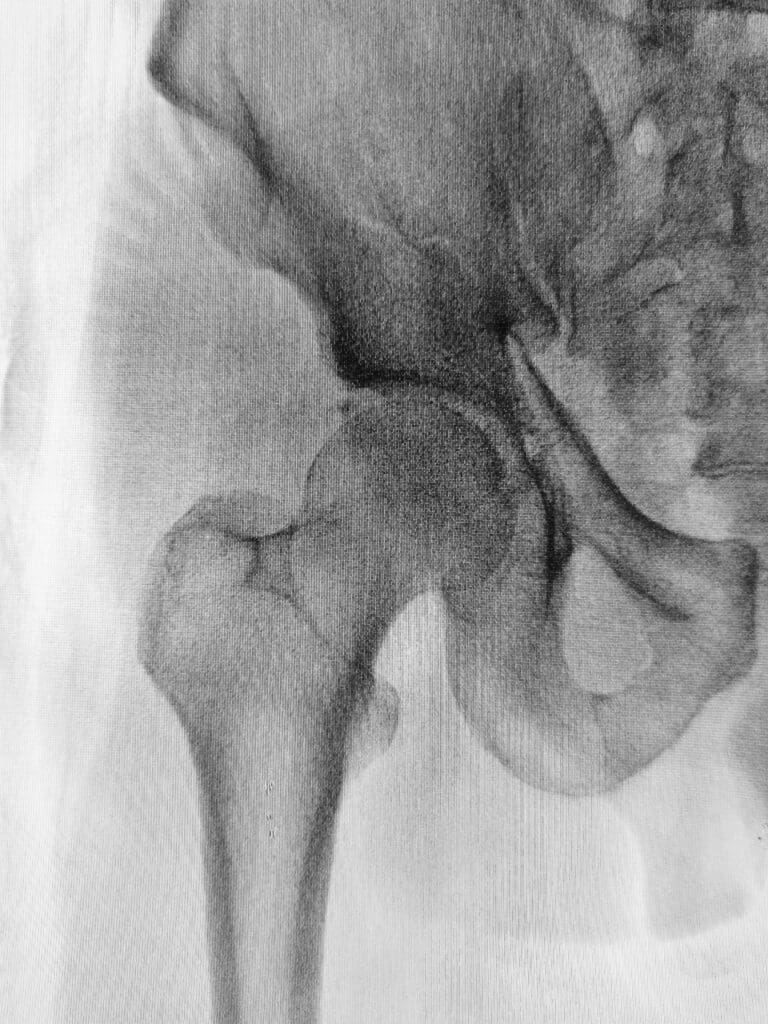
What is hip arthritis?
Arthritis is a condition that affects your joints. The most common type of hip arthritis is osteoarthritis, where the cartilage of your joints gradually wears away causing inflammation and pain.
Arthritis can be a seriously debilitating condition but there are a few signals you can look out for to catch it on time. Although there’s no cure for arthritis, there are different ways hip arthritis can be treated.
In this article, we are going to give you an overview of the 7 most common symptoms for hip arthritis as well as explaining what treatment options are available.
7 signs you might have arthritis of the hip
It is common for arthritis to affect both hip bones, but rarely they are affected to the same extent. When your hip joints are affected by this condition, routine activities can become difficult and painful. Here’s a rundown of 7 signs of hip arthritis:
1. Reduced range of motion
Hip arthritis limits the range of motion in your hips. This means that you might find it extremely difficult to make wide movements with your legs or bend onwards. One example is putting your shoes on; if this action seems hard to perform for you, your hip joint might need attention.
The onset of hip arthritis can be long or sudden. Every patient is different: you might see no signs of the disease for a while or need hip replacement surgery in a matter of months.
2. You have pain in your groin
You feel pain in your groin and it radiates down to your other thigh, buttocks, or knee.
3. Pain gets worse in the morning
Your pain is stronger after a long time of inactivity, e.g. in the morning when you wake up or when you stand up after sitting for a while.
Patients also report increased pain when the weather changes or when it rains.
4. Pain flares up after activity
Just as you might experience pain after standing still, intense activity may also cause pain to flare up. This happens because the missing cartilage causes your bones to rub together frequently and intensively.
5. Basic movements are increasingly painful
Hip arthritis often makes basic movements such as walking, standing up, or climbing the stairs very difficult and painful. This is why this condition is often detrimental to an individual’s quality of life. Also getting out of a car can be extremely painful.
6. Your hip joint locks or sticks
With arthritis, cartilage gradually wears away, causing the bones of your hip to rub together. As a consequence, the structure of your hip might also be affected, causing your hip to stick or lock during movement.
7. Grinding noises during movement
As your hip bones rub together, you may feel your hips make a grinding noise when walking, bending, or moving in general.
How is hip arthritis treated?
Hip arthritis can have an impact on your daily life, making regular activities such as taking a walk really difficult. As already mentioned, arthritis cannot be cured, but it can be treated. There are different surgical and non-surgical treatments available. Here’s an overview.
Non-surgical treatment
Non-surgical treatment aims to manage pain and delay surgery. They can also be combined to ease disability caused by hip arthritis. They include:
- Lifestyle changes: you might be advised to reduce or stop activities that cause pain, as well as losing weight, if necessary. Weight loss reduces strain on your hip joint.
- Physical therapy: specific exercises might help reduce pain and improve mobility. A trained physiotherapist can support you with stretching as well as strengthening exercises to help your hip joint increase range of motion and flexibility.
- Medications: your doctor might recommend or prescribe anti-inflammatory drugs or painkillers such as ibuprofen to help you manage pain.
- Corticosteroid injections: these are injections of a steroid that will help with inflammation, pain, and swelling.
- Canes: to reduce the force that goes against your hip joint, you might be advised to walk with a cane on the opposite side of the affected hip.
- Stem cell therapy: stem cell injections also help decrease inflammation and support healing.
Surgical treatment
When conservative treatments have not been successful or arthritis is too advanced, your doctor might advise you to get surgery.
- Hip replacement surgery, also called hip arthroplasty, involves replacing your hip joint with artificial implants. The goal of this procedure is to allow you to go back to your daily activities without pain. Hip replacement surgery is a major surgery with a long recovery but it’s also the most effective in the long run.
There are different types of hip prosthesis but today’s implants generally last around 20 years. In total, recovery can last up to 2-3 months but you’ll be encouraged to move right after surgery. A physiotherapist will support you with this. Physical therapy is a fundamental part of recovery and you’ll be advised to continue with your exercises also once you are back home.
Following your doctor’s guidelines and recommendations is very important for your recovery after a hip replacement surgery.
- Hip arthroscopy is a minimally invasive surgical procedure where a surgeon examines your hip joint by making a small incision in your hip area. This procedure is designed to both examine your hip joint as well as perform hip surgery, such as removing loose fragments of cartilage, an inflamed joint lining, or bone spurs that cause pain.
If you are unsure of what procedure best suits your needs, contact us! Our team of experienced professionals will be happy to help and give you more information.
Send Request
Register
Visits, hospital procedures
Bariatric Surgery Center
Plastic Surgery Center
Spine Surgery Center
Dental Clinic
OMEGA Imaging Diagnostic Center
Work hours
KCM Clinic Wrocław
Chat KCM Clinic
Locations
KCM Clinic Jelenia Góra
KCM Clinic Wrocław
Parking






